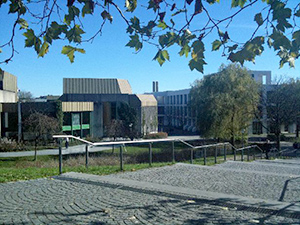Shugo Yamamoto, School of Environmental Science(5)
USP Student report from germany, March, 2011
Shugo Yamamoto, School of Environmental Science
Snow, snow and more snow! Not a warm spring breeze to be found!s
 "Spring is in the air in Augsburg, Germany, in March! " is what I would like to be able to say, but in reality, the bitter winter cold still shows no sign of abating. Snow continues to fall. It will soon be almost a year since I came here as an exchange student. Even though there aren't any major events in Germany until April, there is a festival called "Fasching" (Carnival) with parades of dressed-up people everywhere. According to the Christian church year, the 40 days before Easter are called "Lent" and, during this period, some Christians fast, not eating any meat. This custom originates from the fact that Jesus fasted for 40 days in the wilderness. The Carnival is a showy and merry festival held to try to help people forget the sorrow of not being able to eat meat. Easter is the festival which celebrates the resurrection of Jesus Christ. That is why these events are called the "Goodbye to Meat Festival" and the "Feast of Resurrection". Both of them are important events in the Christian church here.
"Spring is in the air in Augsburg, Germany, in March! " is what I would like to be able to say, but in reality, the bitter winter cold still shows no sign of abating. Snow continues to fall. It will soon be almost a year since I came here as an exchange student. Even though there aren't any major events in Germany until April, there is a festival called "Fasching" (Carnival) with parades of dressed-up people everywhere. According to the Christian church year, the 40 days before Easter are called "Lent" and, during this period, some Christians fast, not eating any meat. This custom originates from the fact that Jesus fasted for 40 days in the wilderness. The Carnival is a showy and merry festival held to try to help people forget the sorrow of not being able to eat meat. Easter is the festival which celebrates the resurrection of Jesus Christ. That is why these events are called the "Goodbye to Meat Festival" and the "Feast of Resurrection". Both of them are important events in the Christian church here.
This photo shows the cityscape of Augsburg, taken from my apartment. This will be my last report as an exchange student. I would like to tell you a bit about something difficult, but something that is very important.
Exchange students from Asia and the Erasmus Program
Even in Augsburg, it is common to come across people from Asia when you move through the city. At the university, in particular, there are lots of Chinese. You might think it is natural for there to be a lot of exchange students from China, since China has more than ten times the population of Japan. However, the Chinese students who are able to go abroad are those who have survived extremely competitive screening systems and are students who have the necessary abilities for studying abroad. Students who want to work in the field of international business are expected to be able to speak multiple languages, and have specialist knowledge in particular fields. Considering that even for those students it is difficult to find a job, I cannot understand how some students think nothing of sleeping during class. Also, for member states of the EU, there is the so-called "Erasmus Program", a system to promote the mobilization of exchange students. Owing to the Erasmus program, since 1984, the number of students who study abroad is increasing, including Augsburg University, though there is no major change in Germany.
In 2010, 305 students studied abroad, with one third of them going to Spain, followed by France and Italy.
Thus, you can see that the system is working successfully in EU areas. In comparison, the same cannot be said about Japanese students. Teachers have the same impression that Japanese students do not really want to study abroad. What might be the reason for these different attitudes in students from different countries? I have come to the conclusion that the number and quality of exchange students are a sign of the current situation of each country. Until I came to Germany, I was indifferent to the phrase "studying abroad", and I never thought about its meaning. Even though individual motives for studying abroad may differ from person to person, almost everyone gains the same benefits. In my case, my outlook on everything has completely changed during my stay here. It is almost as if I was jolted by a 100,000-volt electronic shock. It is hard to explain, but my motivation to study more is stronger now. What are you studying for now?
About German and Japanese Education
Have you ever thought about the education system at university? At present, the university education system in Germany is in a period of transition. From one of my good friends, I have heard complaints about the academy/graduate system (below: BA/MA system), namely, complaints about not being able to study the things you want, when you want, and that finding a job is difficult. At first sight, these may be often-heard complaints, but the problems in Germany's present system are clear. Ever since the Bologna-Process was accepted in 1999, European universities have adopted the BA/MA system. By 2011, all universities in Germany will have implemented this new system. The aims of this system are to make cooperation on the level of higher education easier, to stimulate scientific exchanges, to strive for the stabilization and democratization of the educational foundation for the whole of Europe, and to provide a global vision. The demands of society toward universities are changing with the times, that is, universities need to reform their educational systems. It is necessary to reconsider the present systems as professional education; to improve international competitiveness that crosses border. That is why Germany has changed the university system that they previously had confidence in.
Of course, Japan is no exception to being isolated from the growing trend of globalization. This is my personal impression, but I feel that China is making more efforts in this matter than Japan even though Japan has had a BA/MA system since the postwar period. I realized that we are in the midst of the maelstrom of globalization; my experiences here in Germany have motivated me to study more.
The conclusion of my studies abroad
 During 2010, there were many events. In June, there was the FIFA World Cup and there were a lot of people who were enthusiastic about soccer, painting the German national flag on their faces and arms. Furthermore, with the 20th anniversary of the German reunification in October, the railways started a campaign by which anyone could travel anywhere in the country for 20 Euros. 2011 has also been a memorable year, commemorating 150 years of Germany-Japan relationships. Both of the German-Japanese associations in Munich and in Augsburg have planned various events. I think I have been extremely fortunate to have been able to experience the lifestyle here in Germany, particularly by being here for very special anniversary events that only happen every so often.
There is a German proverb "Andere Laender, andere Sitten," meaning every region has its own customs and that is a matter of course. This proverb resembles the proverb "When in Rome, do as Romans do." This proverb exists in various languages, including Japanese. Even though this seems obvious, it is something very difficult to put into practice. However, if we are willing to adapt, surely that changes how we associate with people. My personal prejudices and views toward other countries, as a student before I came here to study, have now completely changed. These changes in feelings and ways of thinking are part of my personal internationalization. I have only been here studying abroad for a year, but I believe what I have learnt and experienced will greatly influence my way of life from now on. All in all, to put things simply: I am glad to have studied abroad. I am extremely grateful to everyone who provided me with this wonderful opportunity and helped and supported me.
During 2010, there were many events. In June, there was the FIFA World Cup and there were a lot of people who were enthusiastic about soccer, painting the German national flag on their faces and arms. Furthermore, with the 20th anniversary of the German reunification in October, the railways started a campaign by which anyone could travel anywhere in the country for 20 Euros. 2011 has also been a memorable year, commemorating 150 years of Germany-Japan relationships. Both of the German-Japanese associations in Munich and in Augsburg have planned various events. I think I have been extremely fortunate to have been able to experience the lifestyle here in Germany, particularly by being here for very special anniversary events that only happen every so often.
There is a German proverb "Andere Laender, andere Sitten," meaning every region has its own customs and that is a matter of course. This proverb resembles the proverb "When in Rome, do as Romans do." This proverb exists in various languages, including Japanese. Even though this seems obvious, it is something very difficult to put into practice. However, if we are willing to adapt, surely that changes how we associate with people. My personal prejudices and views toward other countries, as a student before I came here to study, have now completely changed. These changes in feelings and ways of thinking are part of my personal internationalization. I have only been here studying abroad for a year, but I believe what I have learnt and experienced will greatly influence my way of life from now on. All in all, to put things simply: I am glad to have studied abroad. I am extremely grateful to everyone who provided me with this wonderful opportunity and helped and supported me.
References
Oshima-Gerisch, Keiko: "Japanese courses in the whole college and UNIcert - Elementary level abilities of Japanese and a plan to adapt for level 1"
International Office of Augsburg University, from an interview with the person in charge of Erasmus 10/02/2011
(May, 2011)

